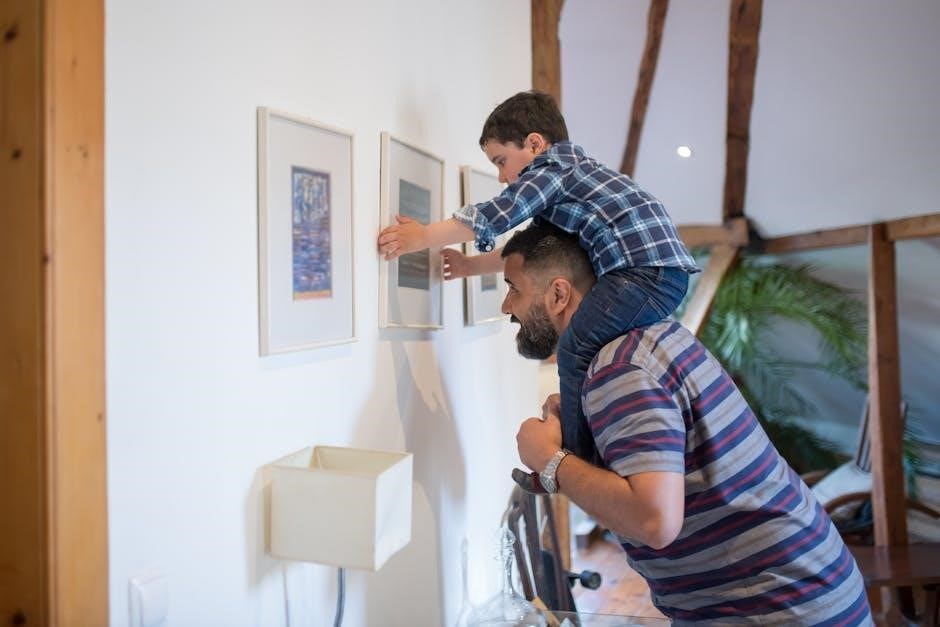The Gottman Sound Relationship House theory provides a comprehensive framework for understanding and strengthening relationships. Developed by Drs. John and Julie Gottman, it is based on decades of research with over 3,000 couples, offering insights into building and maintaining healthy partnerships. The theory emphasizes four key levels: friendship, conflict, shared meaning, and creating a life together, each essential for fostering resilience and intimacy; It serves as a practical guide for couples and therapists alike, promoting effective communication, emotional connection, and lasting fulfillment.
1.1 Overview of the Sound Relationship House
The Sound Relationship House is a metaphorical framework designed by Drs. John and Julie Gottman to illustrate the essential components of a healthy relationship. It is divided into four interconnected levels: friendship, conflict, shared meaning, and creating a life together. Each level serves as a foundation for the next, ensuring emotional stability and resilience. The theory emphasizes building love maps, fostering fondness and admiration, and effectively managing conflict. By addressing these elements, couples can create a strong, enduring partnership. This model is widely used in couples therapy and has been validated by decades of research with thousands of couples. It provides a practical guide for understanding and enhancing relationships.
1.2 The Four Levels of the Sound Relationship House
The Sound Relationship House Theory identifies four distinct yet interconnected levels that form the foundation of a healthy relationship. Level 1: Friendship focuses on building trust, intimacy, and emotional connection through shared understanding and mutual support. Level 2: Conflict involves managing disagreements effectively while maintaining respect and communication. Level 3: Shared Meaning emphasizes creating a sense of purpose and unity by honoring each other’s values and goals. Finally, Level 4: Creating a Life Together involves collaborating on shared aspirations and building a lasting legacy. Each level is crucial for fostering resilience and ensuring a fulfilling partnership. This structured approach provides a clear path for couples to navigate relationship challenges and grow together.
1.3 The Gottmans’ Research and Contributions to Relationship Science
Drs. John and Julie Gottman have revolutionized relationship science through decades of groundbreaking research. Their work, spanning over 40 years, has involved studying more than 3,000 couples, providing unprecedented insights into the dynamics of marriage and partnerships. Their research has challenged common myths about relationships, identifying specific patterns that distinguish successful from unsuccessful relationships. By focusing on observable behaviors and emotional interactions, the Gottmans developed the Sound Relationship House theory, offering a structured approach to understanding and improving relationships. Their contributions have transformed couples therapy, providing practical tools and strategies for fostering intimacy, resolving conflicts, and building lasting connections. Their work continues to inspire therapists and couples worldwide.
Level 1: Friendship
Friendship is the foundation of the Sound Relationship House, emphasizing emotional connection and mutual understanding. It involves building love maps, expressing fondness, and turning toward each other, fostering resilience.
2.1 Building Love Maps
Building love maps is a cornerstone of the Gottman Sound Relationship House theory, focusing on understanding your partner’s inner world. It involves knowing their thoughts, feelings, and experiences, fostering emotional intimacy. By asking open-ended questions and actively listening, couples create a detailed mental map of each other’s lives. This practice strengthens connection and ensures partners feel seen and valued. Love maps are not static; they evolve as individuals grow, requiring ongoing effort to stay attuned. Neglecting this can lead to disconnection, making conflicts harder to resolve. Drs. John and Julie Gottman emphasize that love maps are essential for building resilience and understanding in relationships. Regularly updating them ensures a strong, supportive partnership.
2.2 Turning Toward Instead of Away
Turning toward instead of away is a critical principle in the Gottman Sound Relationship House theory, emphasizing the importance of responding positively to your partner’s bids for connection. This simple yet powerful practice strengthens emotional bonds and fosters intimacy. By actively engaging with your partner, you create a culture of responsiveness, which is essential for relationship satisfaction. Drs. John and Julie Gottman’s research shows that couples who consistently turn toward each other build resilience and navigate challenges more effectively. Conversely, turning away can lead to feelings of isolation and disconnection. This practice encourages active listening, empathy, and shared joy, laying the foundation for a supportive and fulfilling partnership. Regularly turning toward your partner keeps the relationship vibrant and meaningful.
2.3 Cultivating Fondness and Admiration
Cultivating fondness and admiration is a vital component of the Gottman Sound Relationship House theory, fostering a positive emotional connection between partners. It involves actively expressing genuine appreciation and respect for each other, which strengthens the bond and creates a foundation of warmth. By regularly acknowledging and celebrating each other’s strengths, interests, and contributions, couples build a reservoir of goodwill. This practice helps partners feel valued and cherished, countering negativity and fostering resilience. Drs. John and Julie Gottman emphasize that small, consistent acts of admiration and affection can profoundly enhance relationship satisfaction and intimacy. Nurturing fondness ensures that love and connection remain vibrant and enduring.
Level 2: Conflict
Level 2 focuses on conflict, emphasizing its role in strengthening relationships when managed effectively. It highlights understanding disagreements as opportunities for growth and connection.
3.1 Managing Conflict Effectively
Managing conflict effectively is crucial for a healthy relationship. The Gottman Sound Relationship House Theory emphasizes understanding disagreements as opportunities for growth rather than destruction. Couples should focus on de-escalation techniques, active listening, and self-soothing to prevent conflicts from spiraling. It’s important to approach arguments with empathy, avoiding criticism or contempt. By addressing issues calmly and seeking solutions together, partners can strengthen their bond. Conflict management isn’t about avoiding disagreements but navigating them constructively. This level highlights the importance of understanding each other’s perspectives and needs, fostering a culture of respect and collaboration. Effective conflict resolution builds trust and resilience, ensuring relationships thrive even in challenging times.
3.2 The Power of Repair in Relationships
The power of repair in relationships is a cornerstone of the Gottman Sound Relationship House Theory. Repair mechanisms are essential for healing emotional injuries and strengthening connections. When conflicts arise, couples can use de-escalation techniques, apologies, and empathy to mend rifts. Turning toward each other, rather than away, fosters understanding and intimacy. Effective repair involves acknowledging hurt feelings, taking responsibility, and offering reassurance. This process not only resolves disputes but also builds resilience and trust. By prioritizing repair, partners can transform conflicts into opportunities for growth, ensuring their relationship remains strong and fulfilling over time. Regular, meaningful repairs are vital for maintaining a positive emotional climate.
3.3 Accepting Influence and Compromise
Accepting influence and compromise is a vital component of the Gottman Sound Relationship House Theory, fostering mutual respect and collaboration in relationships. By acknowledging and valuing each other’s perspectives, partners create a foundation of equality and trust. Compromise involves finding solutions that honor both individuals’ needs, ensuring neither feels dismissed. This process strengthens emotional intimacy and reduces gridlock in conflicts. Active listening and empathy are key, as they allow partners to understand and integrate each other’s viewpoints. When both individuals feel heard and respected, they are more likely to work together seamlessly, building a resilient and fulfilling relationship. Compromise becomes a bridge to deeper connection and shared growth.

Level 3: Shared Meaning

Shared meaning in relationships involves creating a culture of honor, respect, and connection. It focuses on building rituals, shared goals, and a sense of purpose together, fostering deeper emotional bonds and mutual understanding. This level emphasizes the importance of aligning values and beliefs, ensuring both partners feel seen and appreciated. By cultivating shared meaning, couples strengthen their relationship’s foundation, creating a lasting and fulfilling connection.
4.1 Creating a Culture of Honor and Respect
Creating a culture of honor and respect is essential for fostering a deep emotional connection in relationships. This involves acknowledging each partner’s values, beliefs, and contributions, ensuring both feel valued and appreciated. By prioritizing respect, couples build trust and strengthen their bond. The Gottmans emphasize that this culture is cultivated through small, consistent actions, such as expressing gratitude and actively listening. Rituals of appreciation and shared moments of connection reinforce this foundation. When honor and respect are prioritized, partners feel secure, leading to a more resilient and fulfilling relationship. This level of the Sound Relationship House ensures that both individuals feel seen and respected, fostering a shared sense of meaning and purpose.
4.2 Building Rituals of Connection
Building rituals of connection strengthens emotional bonds and fosters intimacy in relationships. These rituals, such as regular date nights or shared bedtime routines, create a sense of predictability and closeness. They help partners stay attuned to each other’s needs and emotions, even during busy or challenging times. Rituals can be small, like a morning coffee together or a nightly conversation about the day’s events. The Gottmans emphasize that these practices are not just habits but intentional acts of connection that nurture trust and affection. By prioritizing these rituals, couples cultivate a deeper sense of unity and shared meaning, which is vital for navigating life’s ups and downs together.
4.3 Developing a Shared Sense of Purpose
A shared sense of purpose strengthens a relationship by creating a common mission and values. Couples who align on goals, whether personal or societal, foster deeper connection and meaning. This involves identifying shared aspirations, such as raising a family or contributing to a cause, and working together to achieve them. Rituals and open dialogue can help couples discover and nurture their shared purpose. The Gottmans emphasize that this unity not only enhances intimacy but also provides a sense of direction and fulfillment. By building a life rooted in mutual goals and values, partners create a lasting legacy and a resilient bond. This shared purpose becomes the foundation for a meaningful and enduring partnership.

Level 4: Creating a Life Together
Level 4 focuses on creating a life together through collaborative efforts, shared goals, and mutual support. It emphasizes building a meaningful life aligned with both partners’ aspirations and values.
5.1 Making Life Dreams Come True
Making life dreams come true is a vital aspect of the Gottman Sound Relationship House Theory, focusing on supporting each other’s aspirations and creating a shared vision for the future. By understanding and respecting each other’s needs, desires, and goals, couples can collaborate to build a life filled with purpose and fulfillment. This level encourages partners to explore new opportunities together, whether personal or professional, and to overcome challenges as a team. It emphasizes the importance of aligning individual and shared goals, fostering a sense of unity and mutual support. This collaborative approach ensures that both partners feel valued and empowered, leading to a more meaningful and satisfying partnership.

5.2 Overcoming Gridlock in Relationships
Overcoming gridlock in relationships is a critical component of the Gottman Sound Relationship House Theory, focusing on breaking through unresolved conflicts. Gridlock occurs when issues become perpetual and emotionally charged, leading to feelings of hopelessness. The Gottmans emphasize that gridlock stems from unmet needs and lack of understanding. To resolve it, couples must shift from adversarial to collaborative approaches, seeking compromise and emotional soothing. By acknowledging each other’s perspectives and working together, partners can transform gridlock into opportunities for growth and deeper connection. This level encourages empathy, active listening, and mutual respect, helping couples move beyond stagnation and foster a more harmonious relationship dynamic.
5.3 Creating a Legacy Together
Creating a legacy together is the pinnacle of the Gottman Sound Relationship House, focusing on building a shared sense of purpose and meaning. It involves envisioning a future where the couple’s values, goals, and contributions leave a lasting impact. This level emphasizes the importance of dreaming together, supporting each other’s aspirations, and fostering a sense of unity. By aligning their efforts, partners can create a meaningful life that extends beyond their relationship, contributing to their community or future generations. This legacy-building process strengthens commitment and fulfillment, ensuring that the relationship remains vibrant and purposeful over time.



